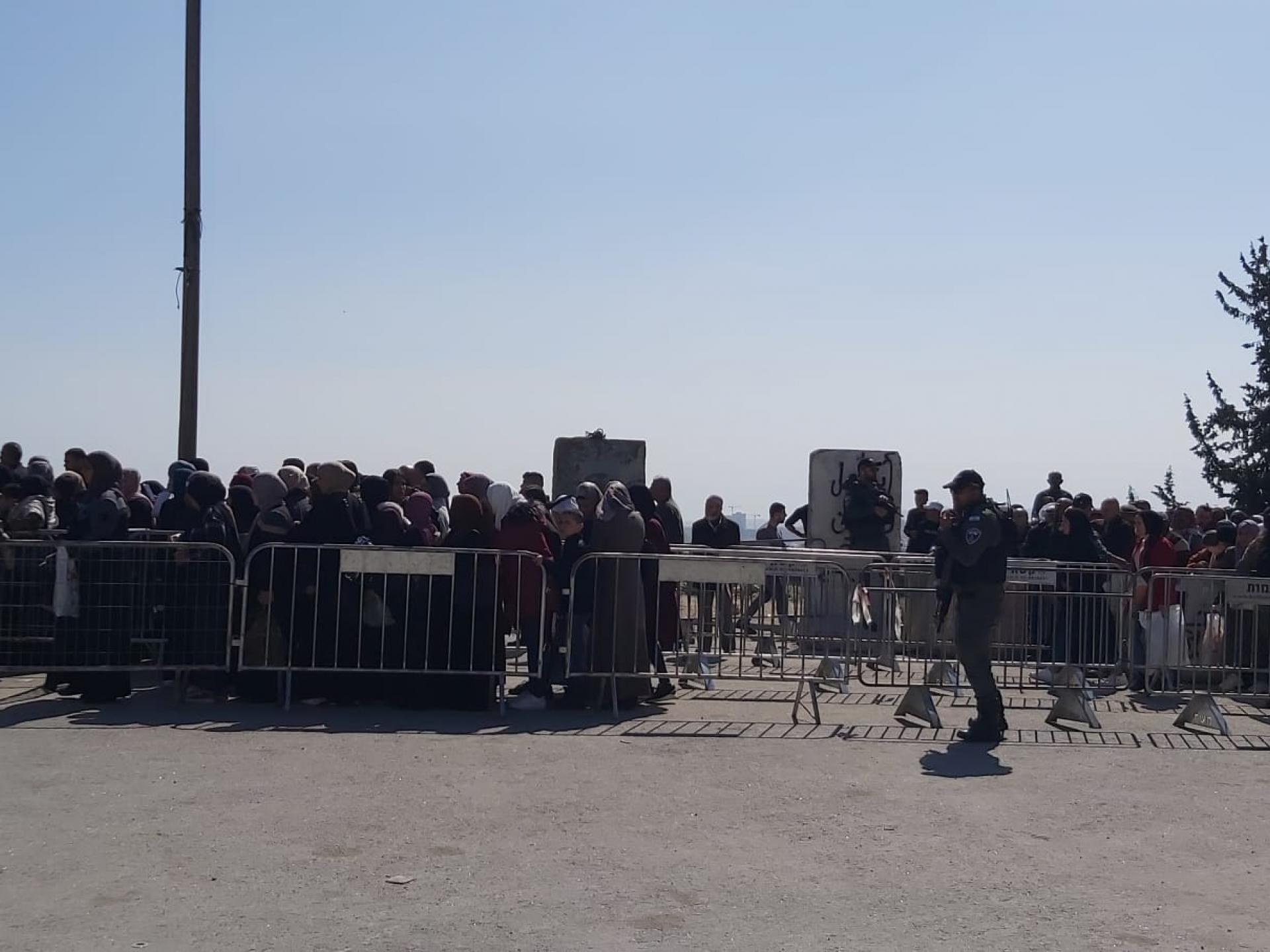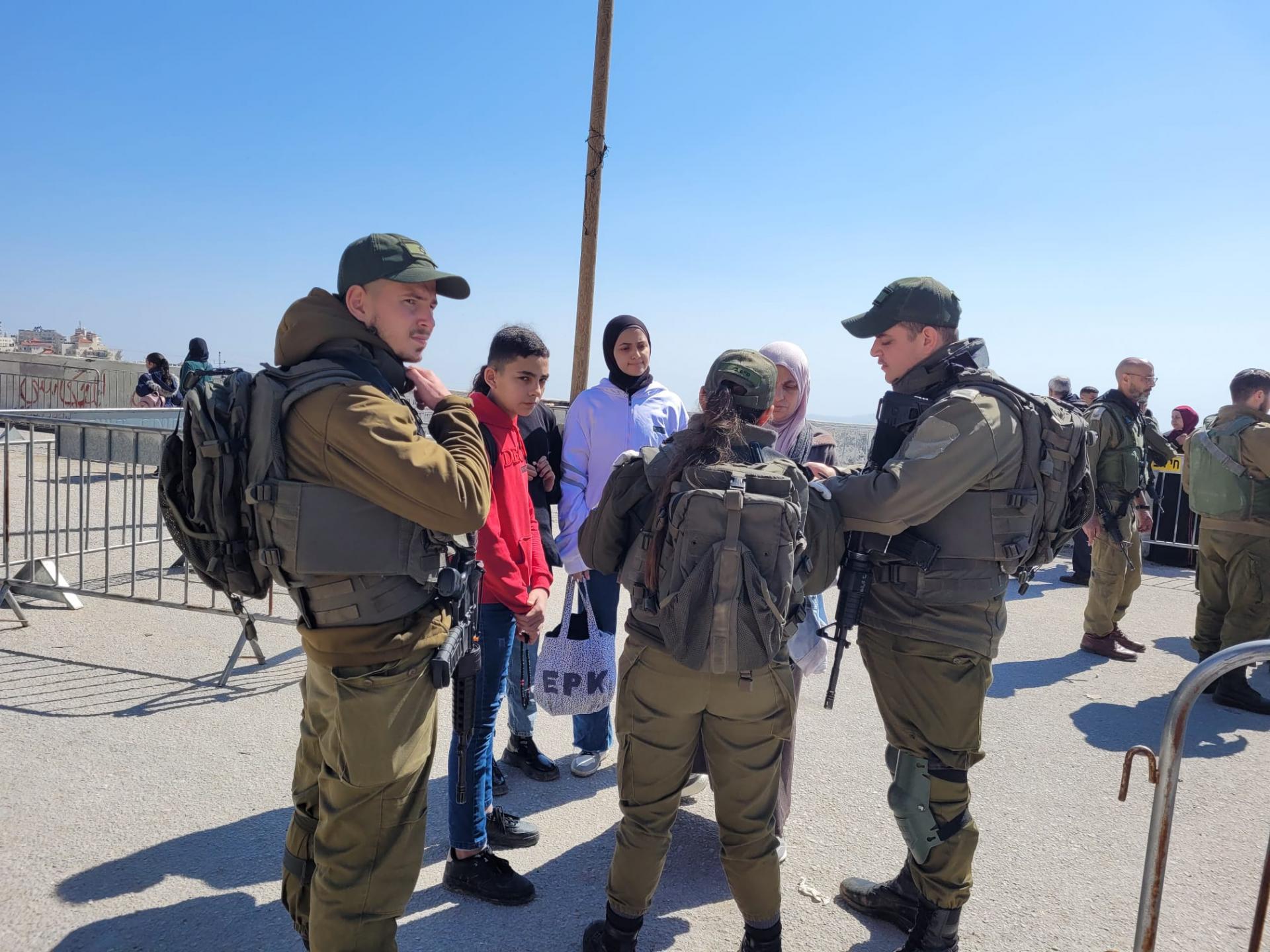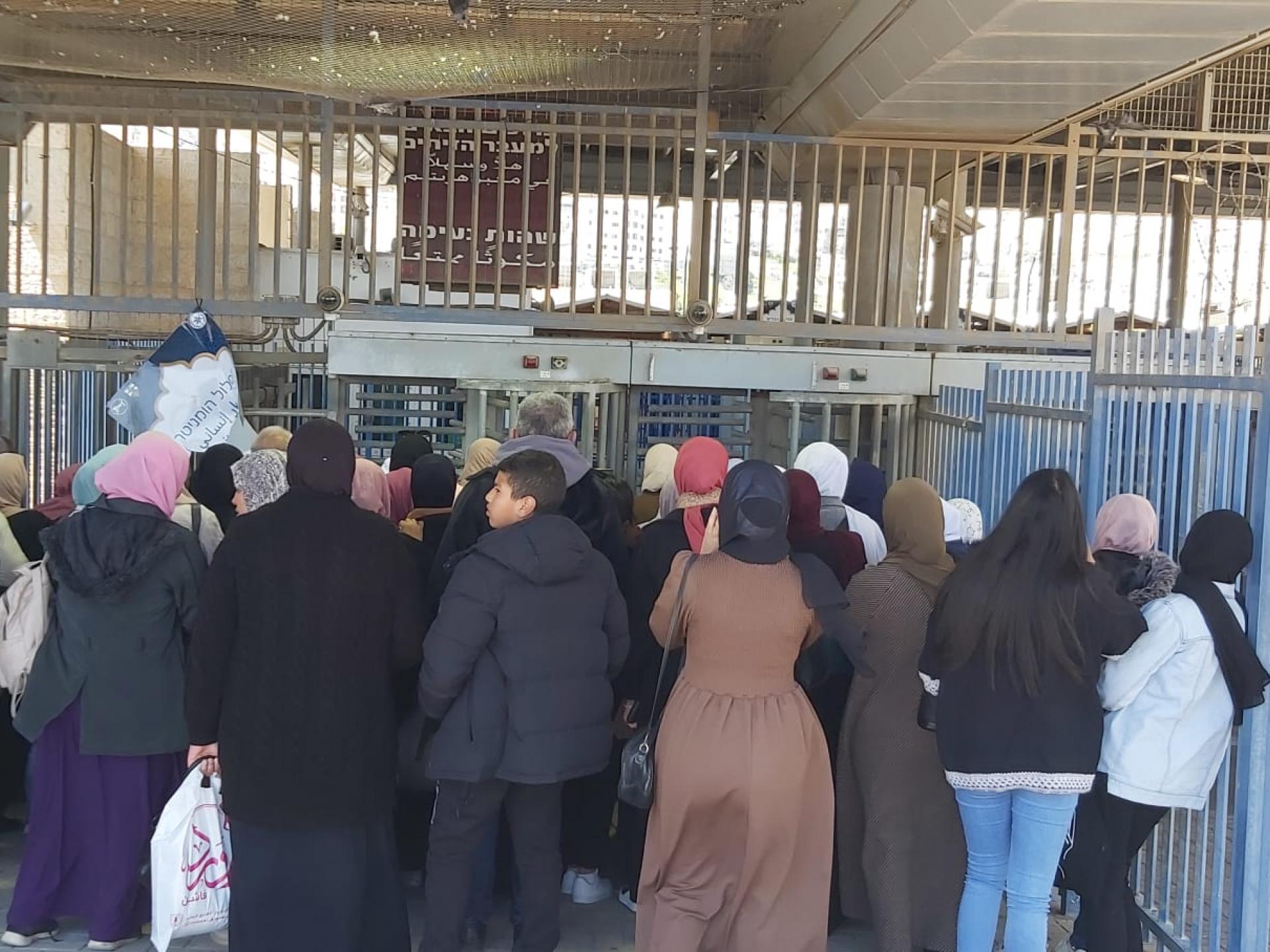Ras Abu Sbitan (Olive CP) - fourth Friday of Ramadan
We arrived just before 10:00 and left at 12:30. Many more people crossed to Jerusalem than did so last Friday. The final estimate was that more than 8,000 men and women went through to Jerusalem. People seemed worried and we didn’t feel a festive atmosphere, though after two or three days of quiet on Haram al-Sharif they decide to ascend there. Many wore warm clothing and carried parcels to spend the night alongside the mosques.
We supplemented the information we were lacking about Ramadan from Kamal, our driver. Monday night (April 17), is the Night of el Kadr: according to tradition, the night on which the first version of the Qur’an was revealed to Muhammad by the angel Jibril (Gabriel). It’s followed additional fast days until Thursday or Friday. Eid el Fitr, celebrating the end of Ramadan, follows the breaking of the fast, and lasts from Saturday, April 22, to Monday, April 24. Will there be special permits for worship that Friday (21 April)? We don’t know.
Many security personnel were at the improvised checkpoint up from the parking lot. There are three booths and many movable metal barriers. Border Police comprised the hard-assed core and gradually guided those arriving into separate inspection lines for men and women (usually being considerate toward children and the elderly), and turned back those who weren’t allowed through because they’d been blacklisted. The MP’s stationed at the crossings inspected permits and documents while rudely shouting at the crowds pressing into the crossing and hurrying them toward the permanent checkpoint after they’d come through.
We should note that soldiers usually stood among the female MP’s inspecting documents, checking as well, so most of the time there were 5-6 people on the job. We’ll also note that after we called the commanders’ attention to how rude were the soldiers at the crossings and the Border Police (especially the females), the message was quietly transmitted to them. That didn’t always help.
Four DCO soldiers (including a young officer and a veteran non-com) dealt with problems that arose; they were attentive and polite. It’s too bad there weren’t more like them.
But even courtesy couldn’t overcome draconic regulations.
In what seemed to us the complete opposite of security considerations, most of the longer inspections were conducted for every family with small children (younger than 12). In addition to the adults’ permit or ID, children had to be accompanied by one of their parents. To do so the soldiers looked them in the eye, asked their name and their birthdate in order to verify what appeared in the adult’s ID card. Oy, oy, oy! How terrible! They’d come with an aunt, or a grandmother? They can’t go through! And then, of course, either they separate, and only some cross, or the entire family returns the way it came.
Why? The official response: only parents are responsible for children younger than 12. And why? To prevent possible complains by Palestinians that Palestinian children were handed over to irresponsible adults. Does that sound logical? Does it contribute to security? It’s our impression that the principal effect is to etch in the hearts of the children and those accompanying them memories of disappointment and injustice.
Here’s another: A father arrived with his three small sons, wearing embroidered jackets with matching hats. The father has an Israeli work permit. He’s able to cross (according to this year’s regulations), but not with his children. His work permit is valid only for him. It doesn’t allow him to bring children. Apparently the rationale behind this draconic rule is that a worker accompanied by his small children represents a greater security threat than the one who comes by himself. Does that make sense? Not to us, nor to the Palestinians, nor to anyone with a head on their shoulders.
At one point a problem arose: all the inspections are conducted via cellphones loaded with apps developed by the Civil Administration . But the batteries of some phones were empty. There were no chargers on site, and power is only available at the permanent checkpoint. What to do? Suddenly the gates
. But the batteries of some phones were empty. There were no chargers on site, and power is only available at the permanent checkpoint. What to do? Suddenly the gates of grace opened and the women flowed through without being checked. And accompanied by their children – have mercy on them! Senior Border Police commanders who’d arrived weren’t happy, but other than sending someone to charge in turn the phones of those in the front line, no solution was found. Everything ended well, and no long lines formed at the permanent checkpoint. Apparently there, too, they found it unnecessary to inspect each and every person as well as the children. And most important – don’t let a crowd form at the crossing and block it.
of grace opened and the women flowed through without being checked. And accompanied by their children – have mercy on them! Senior Border Police commanders who’d arrived weren’t happy, but other than sending someone to charge in turn the phones of those in the front line, no solution was found. Everything ended well, and no long lines formed at the permanent checkpoint. Apparently there, too, they found it unnecessary to inspect each and every person as well as the children. And most important – don’t let a crowd form at the crossing and block it.
At approximately noon they dismantled they temporary checkpoint beyond the parking lot. It was very crowded, particularly in the men’s line, but we’d seen worse on regular days. For the women, at least, it was the best time to come because nothing was checked, and we later learned that at the permanent checkpoint only bags were inspected, not documents. When we’d reascended the gate had already closed. On our way to the car we could hear the muezzins’ calls from the nearby mosques.
What is there to say? It’s no fun being a Palestinian who manages a pilgrimage to Haram el Sharif. After they’d been shoved, and were constantly afraid of being sent back, and were yelled at after they crossed to “get the hell up there,” they reached the buses – where their journey to the Temple Mount and to worship. Ramadan Karim to you, people under occupation!



